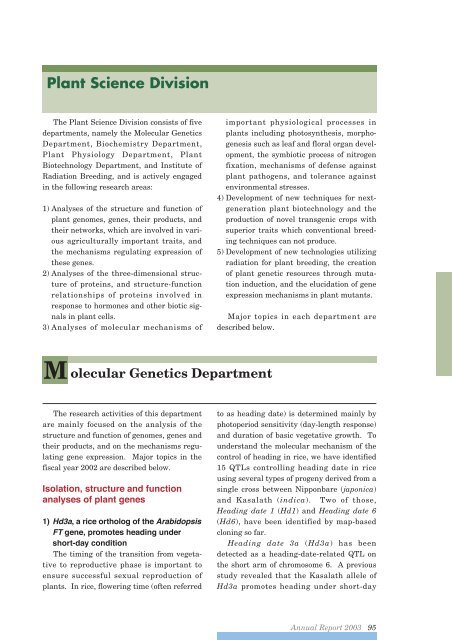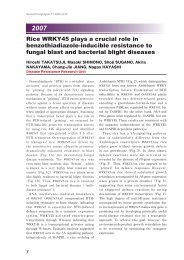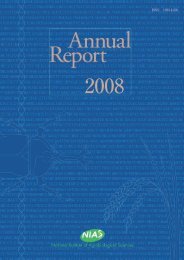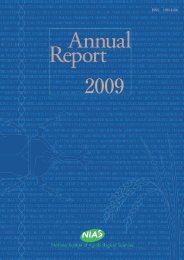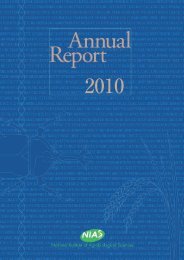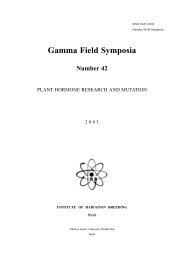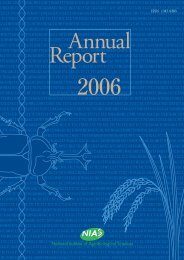You also want an ePaper? Increase the reach of your titles
YUMPU automatically turns print PDFs into web optimized ePapers that Google loves.
Plant Science DivisionThe Plant Science Division consists of fivedepartments, namely the Molecular GeneticsDepartment, Biochemistry Department,Plant Physiology Department, PlantBiotechnology Department, and Institute ofRadiation Breeding, and is actively engagedin the following research areas:1) Analyses of the structure and function ofplant genomes, genes, their products, andtheir networks, which are involved in variousagriculturally important traits, andthe mechanisms regulating expression ofthese genes.2) Analyses of the three-dimensional structureof proteins, and structure-functionrelationships of proteins involved inresponse to hormones and other biotic signalsin plant cells.3) Analyses of molecular mechanisms ofimportant physiological processes inplants including photosynthesis, morphogenesissuch as leaf and floral organ development,the symbiotic process of nitrogenfixation, mechanisms of defense againstplant pathogens, and tolerance againstenvironmental stresses.4) Development of new techniques for nextgenerationplant biotechnology and theproduction of novel transgenic crops withsuperior traits which conventional breedingtechniques can not produce.5) Development of new technologies utilizingradiation for plant breeding, the creationof plant genetic resources through mutationinduction, and the elucidation of geneexpression mechanisms in plant mutants.Major topics in each department aredescribed below.M olecular Genetics DepartmentThe research activities of this departmentare mainly focused on the analysis of thestructure and function of genomes, genes andtheir products, and on the mechanisms regulatinggene expression. Major topics in thefiscal year 2002 are described below.Isolation, structure and functionanalyses of plant genes1) Hd3a, a rice ortholog of the ArabidopsisFT gene, promotes heading undershort-day conditionThe timing of the transition from vegetativeto reproductive phase is important toensure successful sexual reproduction ofplants. In rice, flowering time (often referredto as heading date) is determined mainly byphotoperiod sensitivity (day-length response)and duration of basic vegetative growth. Tounderstand the molecular mechanism of thecontrol of heading in rice, we have identified15 QTLs controlling heading date in riceusing several types of progeny derived from asingle cross between Nipponbare (japonica)and Kasalath (indica). Two of those,Heading date 1 (Hd1) and Heading date 6(Hd6), have been identified by map-basedcloning so far.Heading date 3a (Hd3a) has beendetected as a heading-date-related QTL onthe short arm of chromosome 6. A previousstudy revealed that the Kasalath allele ofHd3a promotes heading under short-day<strong>Annual</strong> <strong>Report</strong> <strong>2003</strong> 95


